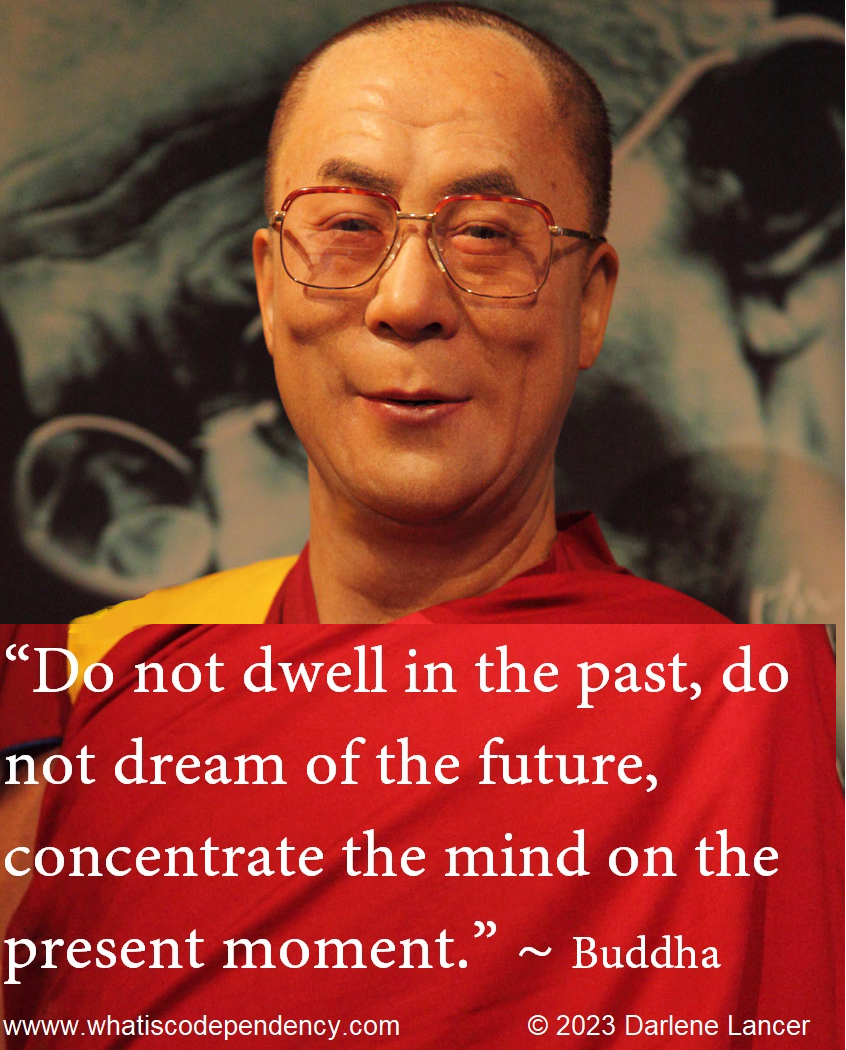 Buddha said, “Do not dwell in the past, do not dream of the future, concentrate the mind on the present moment.”
Buddha said, “Do not dwell in the past, do not dream of the future, concentrate the mind on the present moment.”
Healing and transformation only happen in the present. It frees us from past regrets and future worries. How we use each moment and how we think determine our physical and mental health.
When we cultivate being present, people notice and pay attention. We nonverbally communicate our self-worth, that we matter and expect to be respected. We gain presence that conveys self-acceptance. It enables you to be open and confident.
Openness requires self-esteem that provides courage and allows you to be authentic and take risks. You won’t bother to convince people or make someone like you. You’re not interested in hiding who you are.
Gone are worries about making mistakes and rejection as you would if you’ve suffered from shame and accompanying anxiety and self-doubt. Instead, you listen to others’ opinions, although you may disagree, and associate with friends who do.
Signs of Presence
When you’re present, people can tell and are drawn to you. Your soul shines through. Presence reflects integrity and mindfulness. What are the signs?
- You make eye contact.
- You’re not self-conscious but are fully focused in the present.
- Yet, you’re connected to and aware of your feelings and bodily sensations.
- With another person, you’re able to fully listen without an agenda.
- You accept yourself and are not controlled by fear, shame, or your past.
- You don’t try to fill silences, impress anyone, or seek their approval.
- You’re authentic and don’t hide who you are or your thoughts and feelings.
- You feel equal and connected to others.
- You know who you are and your needs, thoughts, and feelings are separate.
- You don’t react to or defend yourself from others’ opinions.
- You take responsibility for your feelings, words, actions, and triggers with “I” statements.
- You expect to be treated with respect.
- You protect yourself courteously when you feel your boundaries are crossed.
- Your communication is honest, direct, and assertive.
How to Be More Present
You can practice presence throughout your day:
- Accept your thoughts, sensations, and feelings without judgment.
- Be mindful throughout the day to replace negative with positive thoughts.
- Notice whether your thoughts and feelings are related to the present.
- Ask yourself, “Where is my breath?” Is it in your chest, throat, belly? Bring it into your belly.
- When you feel pain in the present, don’t reject it. Accept it, and let it pass through you.
- Connect to your senses. Listen to and honor bodily needs and impulses.
- Accept that unpleasant events are learning opportunities to grow.
- Practice gratitude.
- Speak to yourself kindly with encouragement and gentleness as you would a young child.
- Practice mindful meditation.
Developing Self-Acceptance
Self-Acceptance is a deeper level of self-esteem. (Read “How Do Self-Love, Self-Esteem, Self-Acceptance Differ?”) Meditation and self-love help us practice presence and self-acceptance. There is evidence that high levels of mindfulness correlate with higher levels of self-esteem and more secure self-worth. (1) In a meditative state, we can notice and disregard our self-judgments and anxieties. We can practice presence in that timeless state and learn that moment-to-moment we can accept everything just as it is, including ourselves. This is liberating to us and anyone we encounter.
However, it’s not easy to always function at that level. Without years of practice and healing our past, we soon return to our habitual ways of being. We react and have expectations, frustrations, disappointments, fears, and anxieties.
Being authentic requires that we’re vulnerable. There are many uncomfortable feelings, needs, and states that are part of the human condition. It can be a challenge to be open and accept them all, especially if we have internalized shame. Practicing a loving presence with ourselves enables us to accept and allow whatever we’re feeling to flow through us without attachment. Doing so can heal us, as our habits and past conditioning wash away. Practicing self-acceptance also helps us to accept and not react to others.
We have opportunities throughout each day to accept, allow, and affirm our real self. That also means we may express ourselves, make requests, and set boundaries. We’re neither hiding nor emotionally reacting.
Get the Self-Love Meditation.
© 2021 Darlene Lancer
(1) Thompson, B. L., & Waltz, J. A. (2008).
Mindfulness, Self-Esteem, and Unconditional Self-Acceptance. Journal of Rational-Emotive & Cognitive-Behavior Therapy, 26(2), 2007.

What a great article, Darlene. You hit the nail of mindfulness on the hard head of ignorance!